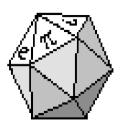Yahoo Clever wird am 4. Mai 2021 (Eastern Time, Zeitzone US-Ostküste) eingestellt. Ab dem 20. April 2021 (Eastern Time) ist die Website von Yahoo Clever nur noch im reinen Lesemodus verfügbar. Andere Yahoo Produkte oder Dienste oder Ihr Yahoo Account sind von diesen Änderungen nicht betroffen. Auf dieser Hilfeseite finden Sie weitere Informationen zur Einstellung von Yahoo Clever und dazu, wie Sie Ihre Daten herunterladen.
Is the greatest common divisor of n^2+1000 and (n+1)^2+1000 always 1?
For each positive integer n = 1, 2, 3, ..., 1000 the gcd of n^2+1000 and and (n+1)^2+1000 is 1. Is this always true?
[Note: I know the answer, but I was surprised. This is based on a similar question someone else asked. Sorry, I don't have the link.]
3 Antworten
- MorewoodLv 7vor 6 JahrenBeste Antwort
Nice work by Mary and Falzoon! (I hope I'm not jumping in too soon.) For those who prefer algebra to bulk arithmetic, here is a classical approach. Apply the Euclidean Algorithm! (For those not familiar with that technique, I've inserted considerable explanation between the essential 3 lines of the proof.)
Any divisor of both [n²+1000] and [(n+1)²+1000] must also divide:
[(n+1)²+1000] - [n²+1000] = [2n+1]
and similarly, any divisor of both [2n+1] and [n²+1000] also divides [(n+1)²+1000] = [2n+1] + [n²+1000], as well as:
2 [n²+1000] - n [2n+1] = [2000 - n]
Hence, unless "n" is even, any common divisor of [2n+1] and [2000 - n] is also a common divisor of the original two numbers and any common divisor of the original two numbers must (regardless of the parity of "n") be a common divisor of:
2 [2000 - n] + [2n+1] = 4001
Which is prime. The desired GCD must divide 4001, and hence is either 1 (like the given examples) or is 4001. In the later case we have that 4001 divides [2000-n], which is so if and only if n=2000+4001k for some integer k.
The GCD is 4001 if n=2000, 6001, 10002, 14003, ... and is 1 otherwise.
Quelle(n): Read about the Euclidean Algorithm: http://en.wikipedia.org/wiki/Euclidean_algorithm - Mary BanusLv 4vor 6 Jahren
Simple excel function will find it.
Column A with 1 to 1000, simple fill!
Column B function =A1^2+1000
Column C function =(A1+1)^2+1000
Column C function =GCD(B1,C1)
n=1 to 1999, GCD=1 , Since you have asked for n=1 to 1000, then answer is yes. ALWAYS 1.//
n=2000, GCD=4001. this is the first GCD other than 1.
I will try how mathematically prove this.
- falzoonLv 7vor 6 Jahren
Smallest counter-example is n = 2000 with GCD = 4001.
Others are n = 6001, n = 10002, n = 14003, etc. with the same GCD.
Looks like the pattern for n is (2000 + 4001*k) for k = 0, 1, 2, 3, ...,
all with GCD = 4001. That is surprising. Now how to prove it?




